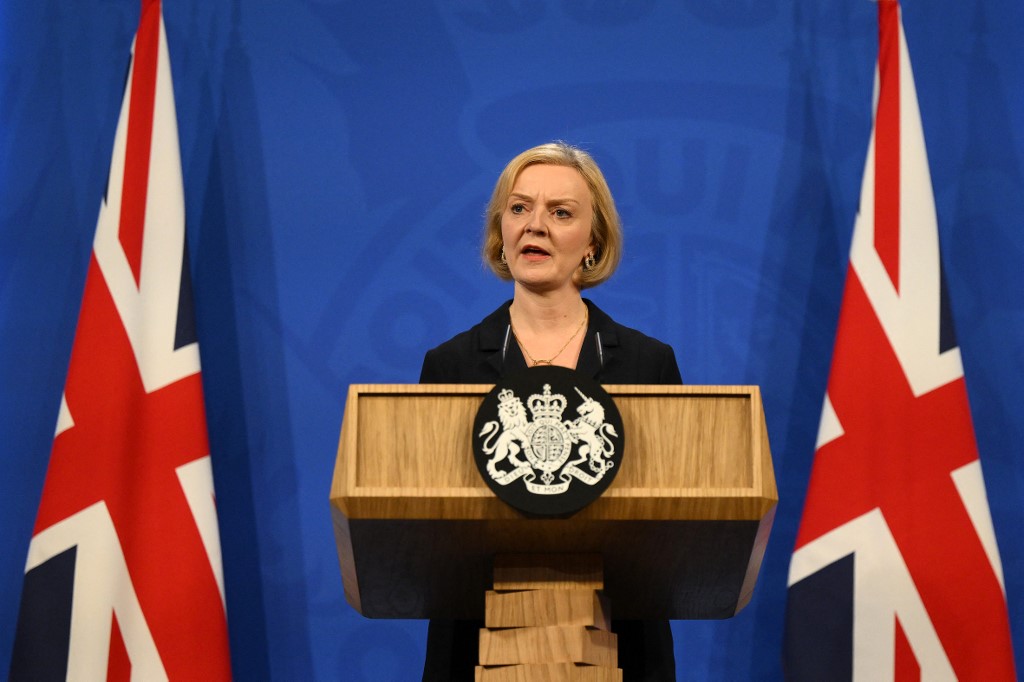
British Prime Minister Liz Truss on Friday dismissed her finance minister, forcing Kwasi Kwarteng to carry the can for turmoil sparked by her right-wing economic platform as restive Conservatives plotted her own demise.
The chancellor of the exchequer was dismissed in person by Truss after he rushed back early from international meetings in Washington, and before she was due to hold her first Downing Street news conference at 2:30 pm (1330 GMT).
Former foreign secretary and former Tory leadership candidate Jeremy Hunt was appointed as Kwarteng’s replacement, making him Britain’s fourth finance minister this year.
“You have asked me to stand aside as your chancellor. I have accepted,” Kwarteng wrote in a letter to Truss, who only succeeded Boris Johnson on September 6.
But he insisted that their economic programme was needed because “the status quo was simply not an option”.
In reply, Truss wrote that Kwarteng had “put the national interest first”.
“I know that you will continue to support the mission that we share to deliver a low-tax, high-wage, high-growth economy that can transform the prosperity of our country for generations to come,” she said.
Financial upheaval sparked by the new government’s September 23 plan to slash taxes — financed via billions in more borrowing — has subsided somewhat since the Bank of England intervened in bond markets.
But the central bank was adamant it would end its bond-buying spree on Friday, and market analysts said only a bigger climbdown by Truss following Kwarteng’s disastrous budget announcement last month would avert fresh panic.
Tony Travers, from the London School of Economics, told AFP Kwarteng had been made “the fall guy for the government’s mistakes” — but that the sacking had not taken the pressure off Truss or calmed the Tories.
“It’s very hard to see them coming back from this” by the next election, he added.
– ‘Not going anywhere’ –
Kwarteng was due to have stayed in Washington this weekend to conclude annual meetings of the International Monetary Fund and World Bank, after earned a rebuke from IMF chief Kristalina Georgieva on the need for “coherent and consistent” policies.
Speaking in Washington on Thursday, Kwarteng had insisted that his job was safe. “I’m not going anywhere,” he said.
But UK broadcasters showed live footage of Kwarteng’s British Airways plane landing at Heathrow airport a day early, after Truss held hurried meetings with her own financial advisors on Thursday in his absence.
Speculation was rife that Truss would row back on planned changes to corporation tax, having already changed her mind about cutting income tax for the highest earners.
The promised tax cuts were the centrepiece of Truss’s successful pitch to Tory party members that she,, rather than rival Rishi Sunak, was the best candidate to replace Johnson.
That programme now lies in tatters, and Truss’s judgement is in question more than ever, after Sunak’s warnings were entirely vindicated: higher borrowing to pay for tax cuts served only to terrify the markets and drive up borrowing costs for millions of Britons.
A new YouGov poll for The Times newspaper said 43 percent of Conservative voters want a new prime minister in Downing Street.
Other polls show a mammoth lead up opening up for the main opposition Labour party, threatening electoral meltdown for the Tories.
– ‘Romcom-worthy dash’ –
Junior minister Greg Hands said “I don’t recognise” multiple reports that senior Tory MPs were plotting to unseat Truss by installing a new leadership team under Sunak and Penny Mordaunt, who also ran to succeed Johnson.
Pressed on whether Truss will still be in 10 Downing Street in a week, Hands told ITV: “Oh definitely.”
The chancellor’s September 23 budget sparked market chaos because of fears it would drive up state debt.
The pound tumbled to a record dollar low near parity with the greenback and bond yields surged, before stabilising thanks to interventions by the Bank of England (BoE).
But with that costly BoE crutch ending on Friday, markets had already priced in a fresh about-turn by the government, leaving Downing Street with no room for manoeuvre.
Sophie Lund-Yates, lead equity analyst at Hargreaves Lansdown, said before Kwarteng’s sacking that his “romcom-worthy dash through the airport” showed the government waking up to financial reality.
But for many pundits, the self-inflicted damage risks proving terminal for Truss and her hard-right platform.
Another new poll by Ipsos showed Truss’s net satisfaction score at minus 51, lower than any of her predecessors this century, while Kwarteng left office with historically low ratings for a chancellor.






